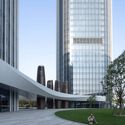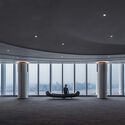
-
Architects: EID Arch
- Area: 370000 m²
- Year: 2022
-
Photographs:CreatAR Images, Arch-Exist, Xi Chen, Yijie Hu
-
Manufacturers: CSG HOLDING
-
Lead Architect: Ping Jiang, FAIA

Text description provided by the architects. The Shimao Riverfront Wisdom Towers is a mixed-use development designed by Atelier Ping Jiang I EID Arch. Situated near the intersection of Airport Highway and Qianjing Third Bridge, the site is a critical urban node for Hangzhou’s Binjiang district. Completed in December 2022, the complex includes office towers, an apartment building, a retail annex, and a park for the public. Hangzhou is best known for its picturesque West Lake, tea farms, and the birthplace of E-commerce giant Alibaba. This project is envisioned as a significant urban gateway, featuring twin towers approximately 280 meters tall, for the IoT area and surrounding smart industry belt.



The project provides 370,000 square meters of new office, residential and retail space. The development is organized as five buildings surrounding a green, public space to stimulate casual gathering and exchange. Towers A and B are centerpieces of the development, accommodating office and residential use. A 3-story annex provides retail space and community-supporting facilities. The horizontal undulating façade of the annex imitates the form of the adjacent river, providing a pedestrian-friendly atmosphere. Unlike conventional commercial high-density mixed-use developments, this project optimizes public open space. The site is open from all sides, attracting visitors from all directions.



The project is in a prominent location near the Qiantang River. This river is historically well-known for its tidal bores or strong surging tides. This inspired an abstract curvilinear, flowing pattern on the towers’ facades. The towers are wrapped with low-iron glass curtain walls, with aluminum vertical fins. Vertical elements have a hierarchy of size and shape, further emphasizing the surging tide concept as the surface of the façade advances and retreats. The building form embraces the beauty of Qiantang River’s ebb and flow and displays refracted light throughout the day.



In contrast to strong form-driven tall buildings in the city, the twin towers in this project stand with a restrained, simple beauty. The architect evocatively captures this in their statement: "In a high-density urban environment, iconic buildings should not only be expressions of novelty and extravagance. Unlike the common trend of seeking height and spectacle in the design of high-rise buildings in China, the Wisdom Towers stand quietly on the banks of the Qiantang River with a restrained elegance and open posture, responding to the local cultural characteristics of the city.”


In collaboration with New York-based structural engineering firm LERA, the design team adopted a dual structural system with a mega-braced frame and core walls. It features eight mega-columns with diagonal bracing placed at four corners close to the building envelope to reduce tonnage while optimizing column-free office space. During the design process, this flexible interior allowed for a seamless change of programmatic use (i.e. office, hotel, apartment, etc.) to respond to market demand changes. This project achieved LEED Gold Certification and features sun-shading aluminum fins and high-performance glass on the twin towers’ facades to reduce glare and solar heat gain.


The project also features the integration of public art with architecture. Adjacent to the central garden space, ventilation and smoke exhaust facilities are wrapped in copper-colored aluminum panels. The panels integrate with the building’s mechanical equipment and have an artistic form to attract people to the central space and increase connectivity between towers. A sculptural, futuristic canopy also connects the bottom of the towers, creating a unique walking experience.


Shimao Riverfront Wisdom Towers pays tribute to Hangzhou city’s unique characteristics with a quiet urbanity and powerful open gesture. The design of the development utilizes advanced materials and innovation to integrate conceptual and practical design methodologies, reflecting the city’s ethos in which traditional and modern elements coexist.



















































